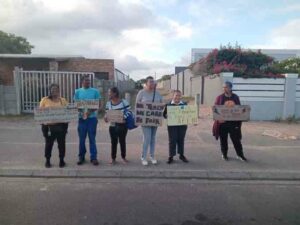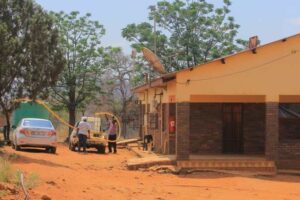Train commuters on Cape Town’s central line which services Khayelitsha and Mitchell’s Plain, the Western Cape’s most populous areas, have welcomed the partial re-opening of the central line.
With more than three years of the central line’s closure, the residents had no choice but to use other, more costly means of transport. The partial opening of the central line from Nyanga station to Cape Town benefits workers and their families as commuters move back to using trains as a mode of transport.
Yamela Simayile from Philippi, a student at Cape College, says that the opening of the central line has helped save him a lot when it comes to his transport fare. “Before I used to miss out on a lot of classes because I did not have money for transport, and in a day I had to use at least R50; now R20 is enough,” said Simayile. Prior to the re-opening of the line up to Nyanga station, he was using a taxi to commute to school.
Even though people are mostly happy with the return of train services, commuters still fear for their safety. “I fear for my life sometimes, because I get off at Gugulethu Junction and make means to get home,” said Simayile.
“We fear that taxi drivers might come and disrupt us here. and cable theft too might once again affect the running of trains,” said Nosipho Mpumela. Mpumela further added how relieved she is because taxi fare is expensive.
According to department of transport spokesperson Lwazi Khoza, to safeguard the rail infrastructure, Prasa implemented a security plan. The re-opening of the central lines, according to the Passenger Rail Agency of South Africa (Prasa), is being done in phases; the line from Cape Town to Langa was the first to reopen and the one to Nyanga was the last. “Nyanga reopened in early April, bringing phase 1 to completion,” said Khoza.
The trains are said to be operating on a two-hourly basis, at 04:35, 06:25 and 08:25 in the morning and in the afternoon at peak hours 14:30, 16:25 and 18:15.
Khoza further enthused how the Nyanga community and surrounding areas are excited with the resumption of services. The focus of the department is now said to be on phase 2 which includes the re-opening of the Khayelitsha and Kapteinsklip lines. “The recovery of these lines will take longer because of the illegal occupation on sections and the extensive damage to infrastructure,” said Khoza.
In a press release by Prasa, the rail agency said that the relocation of the illegal settlements on the railway line is the remaining obstacle to the full rehabilitation and restoration of services on the entirety of the central line. “The relocation process will take place in two phases, with phase 1 being to relocate approximately 1,254 structures located near Langa Station within the railway reserve. Phase 2 of the relocation process is targeting to relocate approximately 3,688 informal dwellers at Philippi Station and 253 illegal dwellers at the Khayelitsha Station”.
One of the many reasons people are most delighted with the re-opening of the central line is the reliability of getting to their destinations on time. “Our arrival time at home has now changed because there are no hiccups along the way such as traffic congestion,” said Axole Keyise from Nyanga.





